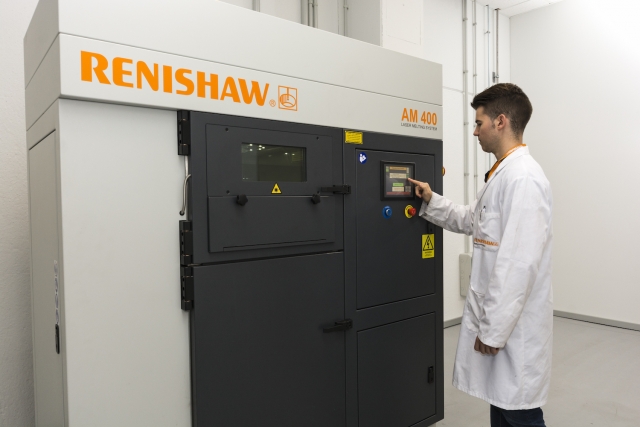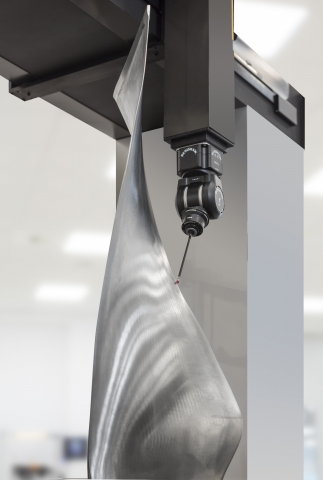Renishaw’s Spanish subsidiary Renishaw Ibérica, S.A.U. is working with a unique selection of other Spanish engineering companies and research centres in a ground-breaking project which could change the way aerospace turbines are manufactured forever.

Led by the aero engines and turbines manufacturer ITP and with the cooperation of several other Spanish companies, universities and technology centres, the objective of the Futuralve project is to create advanced material and manufacturing technologies for the new generation of high speed turbines for the aerospace sector. The four-year project is funded by the Spanish Government through the Centre for the Development of Industrial Technology (CDTI).

Throughout the project, Renishaw is directly involved with the development of new lightweight additively manufactured materials capable of withstanding high forces at extreme temperatures.
As well as providing reductions in weight and an increased resistance to high temperatures, additive manufacturing opens new possibilities in design, reduces the amount of raw materials and vastly cuts product development times.
Renishaw will also contribute to the metrology and part verification of the aerospace parts throughout the Futuralve project with its five axis measurement system REVO and on-machine contact scanning system SPRINT.
Additive manufacturing
Renishaw will specifically be working alongside CATEC, Centre for Advanced Aerospace Technologies based in Seville (Spain) and a user of Renishaw´s metal powder bed fusion additive manufacturing machines, to develop machine parameters for nickel based alloys, study the mechanical properties of the material and optimise the additive manufacturing processes.
One of the subtasks of the project is to analyse the development and properties of turbine components manufactured by conventional processes, such as machining, and their adaptation for manufacturing by laser-based additive manufacturing technologies.
Dr Marc Gardon, PhD of Material Science in Renishaw Ibérica, states that “high performance components within aerospace turbines require materials able to maintain excellent mechanical properties in very aggressive environments. In this framework, nickel based super-alloys that are manufactured from subtractive machining have certain design limitations, which may hinder the overall efficiency of the engine/system.
“Therefore, a convenient scenario is identified for additive manufacturing, where complex geometries unreachable by conventional procedures could be manufactured. Nevertheless, super-alloys can present more than 10 alloying elements, which lead to distinct phases, microstructures and mechanical properties. Renishaw is developing advanced criteria regarding how the laser and process parameters interact with the powder bed in these complex materials. This required effort, which is one of the key themes in the Futuralve project, is essential in manufacturing fully satisfactory components and therefore approving additive manufacturing as a production method within the aerospace supply chain.”
Metrology
The twin drivers of efficiency and safety force any manufacturing company working within the aerospace sector to undertake repeatable, traceable, efficient work to the finest tolerances. As the Futuralve project aims at re-designing safety critical flying parts it is crucial that they meet their design intent.
By cooperating with the CFAA (Aeronautics Advanced Manufacturing Centre) in the Basque region of Spain, Renishaw will use its innovative technology in the study of components made using additive technology, through 5-axis inspection with and without contact, with REVO. These extremely critical parts in the aeronautical sector require alternative solutions to the traditional measurement and measurement cycles, therefore minimizing the inspection times while increasing the productivity at the same time.
Renishaw Ibérica´s managing director, Víctor Escobar, comments that “the Futuralve project, as well as incorporating our coordinate measuring machine and additive manufacturing products, will utilise Renishaw´s innovative on-machine tool contact system SPRINT.
“SPRINT significantly increases the number of scanned points on parts manufactured or repaired in a way that allows a more precise machining and a reduction of measurement times.”
Escobar also comments that “by taking into account the quality controls required by the aeronautical customer, it is of vital importance to develop throughout the project the capabilities to control key features of each part (such as diameters, thread parameters, depths and thicknesses) in a productive environment for feedback in a closed loop that ensures the quality standards are met.”
In addition to Renishaw Ibérica, other business partners in the Futuralve project include ITP, Metalúrgica Marina, Mizar Additive Manufacturing, ONA y Metrología Sariki. These companies are each involved in different ways within the value chain of design, development and production of aerospace parts.
